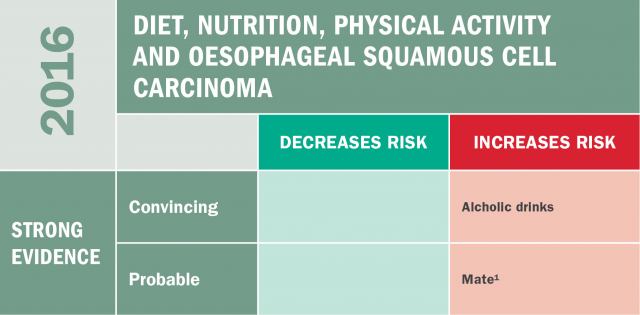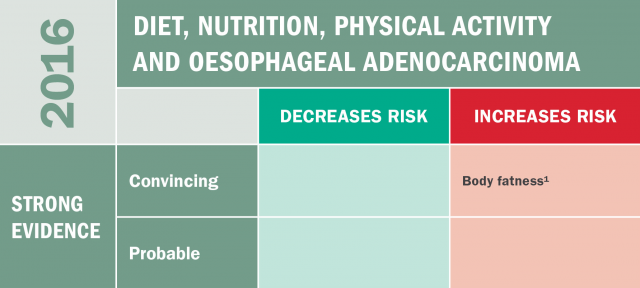This blog was last updated on April 1, 2021.
April is Oral and Esophageal Cancer Awareness Month. In 2021, ACS estimates there will be 19,260 new esophageal cancer cases and 54,010 new oral cancer cases with a combined total of 26,380 deaths.
Second to lung cancer, esophageal cancer is highly preventable. AICR estimates that 69% of esophageal cases in the U.S. could be prevented if Americans followed AICR’s Cancer Prevention Recommendations. The top risk factors for developing this type of cancer include drinking alcohol and having overweight or obesity. Evidence from AICR’s latest CUP Report suggests that eating a diet high in vegetables and fruit and being physically active may help reduce esophageal cancer risk, but more research is needed to confirm these links.


Gastroesophageal reflux disease (GERD) can also be a risk factor for esophageal cancer. The more often that stomach acids reflux and come in contact with the esophagus, the more likely it is that cells can change in a way that increases risk of cancer. You can learn more about GERD from the National Institute of Diabetes and Digestive and Kidney Diseases. If you have GERD, you can reduce your symptoms by:
- Quitting smoking
- Losing weight if needed
- Eating small, frequent meals
- Avoiding lying down for 3 hours after a meal
If you aren’t following AICR’s Cancer Prevention Recommendations, here are some tips on how to start practicing healthy lifestyle habits to reduce your risk of esophageal cancer.
- Limit alcohol consumption to one drink per day for women and two drinks per day for men. For cancer prevention, it’s best not to drink any alcohol.
- Follow AICR’s New American Plate principle when building your meals. Fill 2/3 of your plate with vegetables, fruits, whole grains, beans or nuts/seeds.
- Get at least 150 minutes of moderate physical activity each week. This can be as simple as taking a 15-minute walk in the morning and in the evening, 5 days per week.
- Use AICR’s Food Facts page as a guide to choosing nutrient-dense foods.
Developing healthy habits takes time, but it’s never too late to start making healthier choices to reduce your risk of cancer. For more advice on preventing oral cancer and proper care during oral cancer treatment, click here.
Easily access information on esophageal cancer by purchasing AICR’s latest brochure, Reduce Your Risk of Esophageal Cancer.





